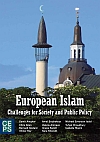Access to Media for European Muslims
Access to Media for European Muslims
Author(s): Isabelle Rigoni
Subject(s): Media studies, Politics and religion, Ethnic Minorities Studies
Published by: CEPS Centre for European Policy Studies
Summary/Abstract: Despite its rank as the second-largest religion in several European countries, Islam is facing severe resistance at both state and societal level. Certain conservative political and media discourses associate Islam with violence and fanaticism. For most Muslims, however, their religion is associated with notions of justice and democracy. The conflict between these two conceptualisations of Islam has reinforced defensive attitudes on both sides. While Muslim stereotypes have increased since 9/11, so have the voices in favour of civil liberties for Muslims in Europe. As is argued here, ethnic media (i.e. Muslim media) are playing a major role on both sides of the debate.
These questions are of common concern to many EU member states and associated states and European institutions. They are based on three assumptions. Firstly, new information and communication technology (ICT) has reshaped the media scene, which is now accessible to increasing numbers of people, including exchanges between European countries and third countries. Secondly, the transnational mobilisations are increasingly influenced by ICT, which makes it possible for individuals to travel – both virtually and in reality – between several countries. Thirdly, the representation of the minority or marginalised groups, particularly in the case of Muslims, has become one of the key questions of European sociopolitical debate, and at the same time can be seen as a test for European democracy.
I would like to propose a historical reading of the representation of Muslims and Islam in the media. It is a question of understanding how media discourse evolved as it did and how and when Muslims are portrayed in the media. Several questions can be raised: How do media technologies influence conditions within both the Muslim community and the mainstream? What are the consequences of national and EU policies for Muslim citizens and their media regarding their social and political inclusion? How do European Muslims aggregate interests in a more effective and efficient way via their own media? Do Muslim media advocate social inclusion or pursue narrow interests?
Book: European Islam. Challenges for Public Policy and Society
- Page Range: 107-123
- Page Count: 17
- Publication Year: 2007
- Language: English
- Content File-PDF

